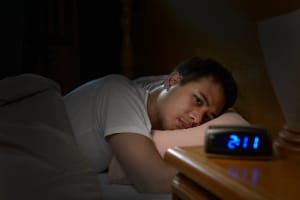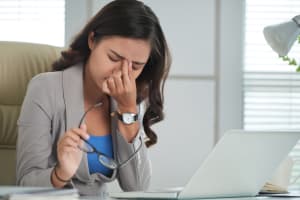
Anxiety has an especially insidious relationship to sleep. Sleeplessness, caused by symptoms of anxiety, will inevitably lead to more trouble falling asleep. The two feed off of each other in a downward spiral that can make life miserable.
Sleep is an important tool to manage anxiety; therefore, it is extremely important to understand how the two relate, and how to manage a healthy sleep cycle even when suffering from symptoms of anxiety.
The Anxiety and Depression Association of America is a leading nonprofit dedicated to raising awareness of mental health issues. According to them, anxiety disorder is the single most common mental illness in the United States. Over 40 million U.S adults suffer from the disorder, constituting a massive 18% of the population.
How anxiety affects the body
The relationship between sleep and anxiety is embedded in the symptoms of mental illness. Having a basic understanding of how anxiety works can help in creating strategies to manage it, especially when it comes to sleep.
There are several types of anxiety disorders, ranging from generalized anxiety to specific phobias. The Mayo Clinic lists the following symptoms for generalized anxiety:
- Constant worrying about things in a way that is “out of proportion”
- Overthinking everything
- Feeling threatened in unthreatening situations
- Fear or discomfort with uncertainty
- Extreme hesitancy and fear of making bad choices
- Inability to relax or set aside worries
- Difficulty concentrating, accompanied by the feeling of a blank mind
The Mayo Clinic also lists the following physical symptoms:
- Tiredness (fatigue)
- Muscle tension and soreness
- Twitching and trembling
- Frightens easily
- Increased sweating
- Stomach problems including nausea, diarrhea, and even irritable bowel syndrome
- Irritability

The severity of any and all of these symptoms fluctuates depending on a number of stress factors, and the patterns of symptoms present can be different in every individual case of anxiety.
Scientists are still unsure about the neurological root causes of anxiety disorders. A 2017 review found that due to its overlap with other mood and affective disorders, scientists had yet to specify with certainty the biological mechanics of how anxiety affects the brain of people. Scientists hypothesize that it might be related to a chemical imbalance affecting our “fight or flight” response, which defines how we physiologically and psychologically react to different situations. The amygdala is necessary for this process and remains a target of study.
How anxiety affects sleep patterns
It is important to reiterate here that there are several specific disorders associated with anxiety. PTSD, panic disorder, generalized anxiety disorder, and OCD are but a few that rest within the spectrum. Each of these has been associated with its own effect on sleep, some of which are discussed below.
- Panic Disorder: Patients with panic disorder have been found to have reduced sleep efficiency, the ratio between the time they spend in bed and the actual amount of time they sleep. Patients typically find it difficult to fall asleep and stay asleep as well. Often they are interrupted by night time panic attacks and suffer from insomnia as a result.
- Generalized Anxiety Disorder: Studies have found that up to 70% of patients who suffer from GAD also suffer from chronic insomnia. It has been speculated that people with insomnia, usually at the hands of racing thoughts and worry, might even be recognized as a symptom of GAD. Regardless of which one causes the other, lack of sleep can exacerbate other symptoms of GAD.
- Obsessive-Compulsive Disorder: Results of studies aimed at identifying the exact relationship between OCD and sleep have been mixed. Many of them report links between insomnia and OCD, though no conclusive data suggests there is a significant impairment in the quality of sleep for people with OCD.
- Post Traumatic Stress Disorder: Evidence has also been mixed on whether PTSD patients suffer significant sleep disturbances as a result of their disorder. Some studies have found that there is an increased REM density (more active eye movements) in PTSD patients, suggesting more intense dreams. This could be a result of their inability to stop reliving traumatic events, which might follow them in their dreams.
Overall, anxiety seems to be linked to difficulty in falling asleep (insomnia), and in some cases an increase in sleep disturbances throughout the night.
Tips for maintaining healthy sleep
 To address the main sleep problems associated with anxiety, try the following tips and tricks to manage symptoms during bedtime:
To address the main sleep problems associated with anxiety, try the following tips and tricks to manage symptoms during bedtime:
- Seek treatment for your anxiety disorder: This might be the most effective way to get a good night’s sleep if you have anxiety. Visit a specialist to determine which type of treatment is right for you, be it therapy, medication, or a combination of the two. Treating the root causes of the problem is the best way to ensure that sleep problems are reduced as well.
- If you are on medication, note side effects: Some medications can keep you up at night, even if they are not prescribed directly for anxiety. Talk to your doctor about your trouble sleeping, and work together to determine if medication might be the cause.
- Eat healthily, and exercise regularly: A good diet and routine exercise can go a long way in defeating sleep problems, as well as symptoms of anxiety. Make sure not to eat heavily or exercise too close to bedtime.
- Avoid stimulating or depressing substances: Caffeine, nicotine, alcohol and other drugs can complicate your sleep cycle and increase symptoms of anxiety. If you suffer from panic disorder, you might want to consider excluding caffeine from your diet entirely.
- Avoid electronics and bright lights before bed: Exposing yourself to artificial light in the evening will interrupt the body’s natural process of growing drowsy and inducing sleep. Consuming stimulating information close to bed can also contribute to racing thoughts and worrying thought patterns that might keep you up.
- Find your own way to relax: Whether it’s with music, a hot bath or meditation. Finding personalized tools and techniques that allow you to calm your mind before bed will improve your chances of falling asleep quickly. That will help you to sleep soundly throughout the night.
Leave a Reply